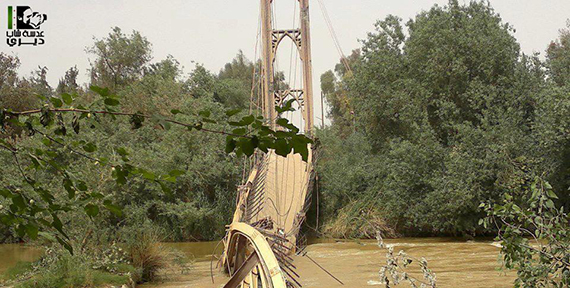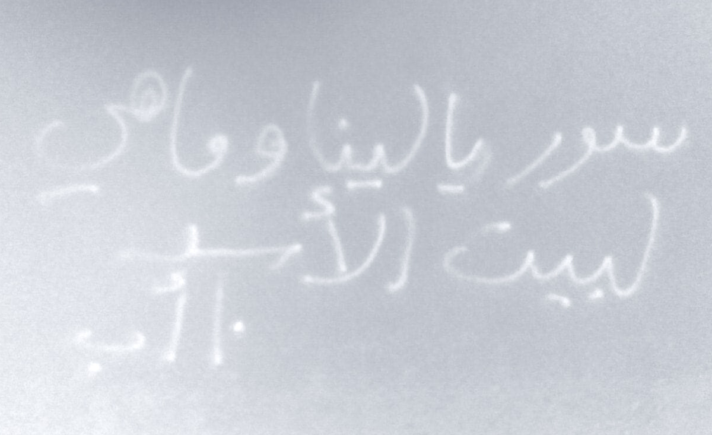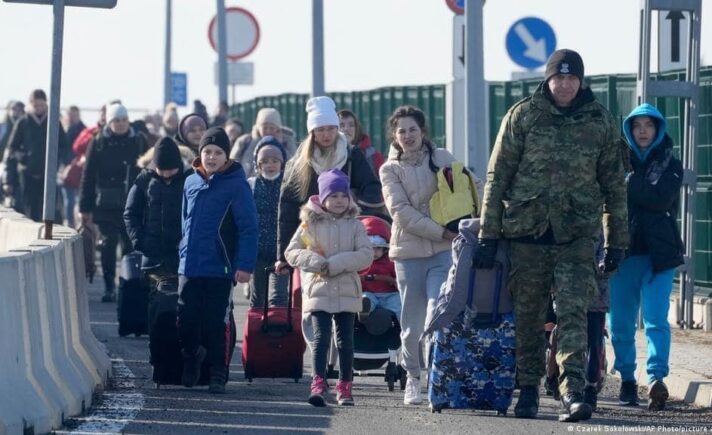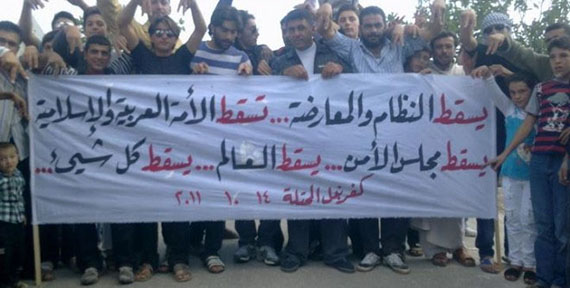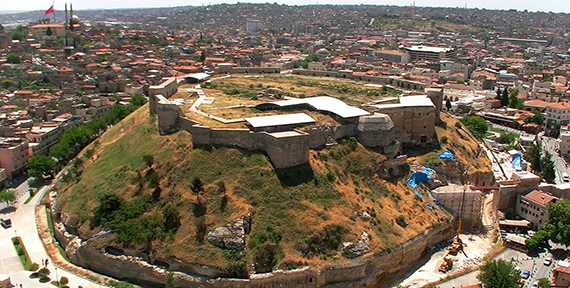Perhaps the first question that would come to the reader’s mind is, “why say “Deiris” instead of “the people of Deir ez-Zor? Why use such an extremely local term? Are they an ethnic group? Do they seek secession? Are they opposed to the borders of the Syrian state in its current form, in a time when transnational movements are active all over the Middle East?” I can be fairly certain that, no, they do not. To whomever hears their harsh accent and asks, “are you Iraqi?” however, the answer would always be, “no, I’m a Deiri.” The question is, why is it not, “I am a Syrian”?
Daesh has seized control over most of Deir ez-Zor since 2014. Forces loyal to the Syrian regime, on the other hand, have only maintained presence in the small part they have retained since the insurgency started in the governorate. Back then, Free Army factions had been leading a military campaign and striving to liberate most of the governorate, before they were quelled rather by Daesh, which has since occupied all of the liberated areas. The next two years witnessed a rising rhetoric about the necessity of better representation for the people of Deir ez-Zor in opposition organizations, which developed later into many attempts to create regional political bodies exclusive to the people of Deir ez-Zor, all attempting to grant them one political voice.
Most of these experiences have been unsuccessful, while many others continue to seek success. All of these initiatives revolved around one single proposition, which is to unite efforts in service of the governorate. Moreover, they have all lacked a clear vision in regards to core issues, such as the unity of Syrian territory, federalism, and the relationship with the Kurdish component, for whom the majority of these initiatives do not harbor the best of intentions.
A few others went as far as to invoke a “Deir ez-Zor State,” basing their propositions on on unconfirmed conclusions regarding the abundance of oil reserves in the governorate lands, which would grant its locals the capacity to declare their own state. This discourse is not based on any concrete steps whatsoever, but it nonetheless is spreading among the Deiri public, who discuss it at length in their private gatherings. This proposition is primarily supported by the notion that other governorates have let the rebels of Deir ez-Zor down, and left them to face the brutality of Daesh by themselves. This fate has constituted a catastrophe for Deir ez-Zor, as losing to the terrorist organization resulted in the displacement of all revolutionaries, rebel fighters and civil activists alike. This abandonment and subsequent defeat reopened old wounds about the forty-year-long marginalization of the eastern region in general, and Deir ez-Zor in particular, by the Syrian regime, promoting a notion that Deiris have, over the course of the revolution, only moved from one form of marginalization to another.
Youths Taking the Lead
Twenty-two human rights, media and political activists from Deir ez-Zor, living in exile, announced a political party with the aim of creating a framework for political activity in the eastern region of Syria. We met one of those activists in the Turkish city of Reyhanlı, near the Syrian border. All the individuals behind this initiative recognized the necessity of political pluralism in the region, stressing that they only represent themselves, as not to be attacked by other activists from the region for having claimed otherwise.
Activist Mazen Abu Tammam (29 years) was one of these activists. He is a designer and photographer, and dreams of working his way into documentary making. Before joining the group’s constituent workshop, the young man had no ambitions of working in politics. In order “to do something of benefit to the people of Deir ez-Zor,” however, he said he would certainly take part. This was his first remark when we asked him about the Al-Mashriq Political Movement, which he has been one of its co-founders.
Mazen attempted collective political activity in several revolutionary assemblies. He had worked in 2012 on establishing a youth assembly in his hometown of Al-Asharah, east of Deir ez-Zor, which participated in coordinating many civil activities, as well as issued a newspaper printed with a modest budget. Being a designer, he was tasked with designing the logo of the nascent Al-Mashriq Movement. He chose a popular design to be the foundation for his logo, with the permission of its original designer. It depicts Deir ez-Zor’s suspension bridge, tied to all other Syrian governorates, highlighting the Movement’s adherence to the territorial unity of Syria, which was the first principle emphasized by the nascent Movement in its founding statement.
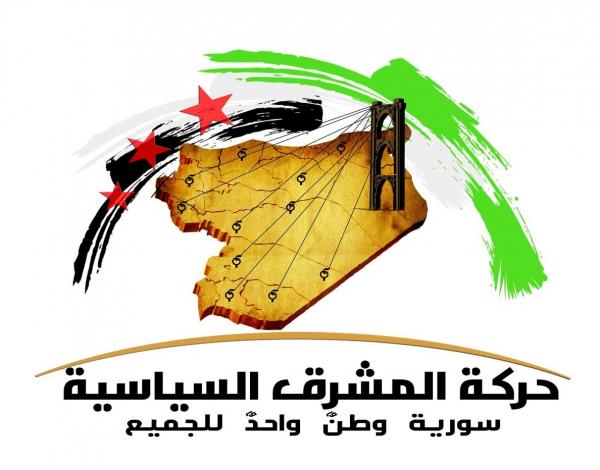
Mazen chuckles as he recalls the reaction of Deiris to the announcement of the Movement. “We, the founding members, were subject to attacks on social media,” he said. “Some said that we do not have a true belonging to Deir ez-Zor, and that no one had heard of us, while others said that we are affiliated with parties with which we have no relationship whatsoever.” The most amusing comment to Mazen was “what someone wrote on our official page on Facebook: ‘You’re agents to external forces, it’s evident by your logo.”
Mazen suspects that the launch of Al-Mashriq Political Movement took many people within and beyond the governorate by surprise. He believes that their vision was much clearer than many other political initiatives that have been put forward with regards to Deir ez-Zor: “It was astounding that activists would gather in secret and then catch everyone by surprise as they launch a political initiative. Being mostly young, they frightened the well-established structures, such as traditional tribal and political figures.”
This experimentation period not last long. A few months later, youth motivations quickly receded as the movement was put to the test. As the US State Department attempted to communicate with members of the movement in order to get acquainted with them, personal attacks and incitements increased on social media. The Movement’s members opted to decline holding a Skype conference with a US delegation that had expressed willingness to meet with Movement representatives.
When discussing the experience of Al-Mashriq Political Movement, we ought to outline some of its major characteristics. The Movement was largely comprised of youngsters working in relief, media and documentation in the aftermath of the Syrian revolution. They had been determined to uphold the principle of the territorial unity of Syria, while stressing at the same time that the Movement is but a regional political movement, trying to devise a Syrian version of regional parties which are active in some other countries. Furthermore, they seemed to have learned from the mistakes of past political entities, such as the National Council and the Opposition Coalition, as they elected a head of the Movement who resides within Syria, and opened a center inside Syrian territory, while emphasizing the fact that Movement members only represent themselves. As I examine the experience of the Movement, I ought to allude to the fact that the Al-Mashriq Movement’s experience resembles more than anything the Coordination-Committees which spread across the country throughout the years of the Syrian uprising. For instance, meetings were generally conducted on social media, and focus lied with what to do rather than what to believe, all of which were characteristic of Coordination-Committees. This may be attributed to the fact that the majority of the founding youngsters have had relations with coordination activity during the protest movement.
The Elders
Over the past year and a half, a number of well-known politicians within Deir ez-Zor have increased the frequency of their meetings with the people of the governorate, primarily in order to build communication networks, and also to initiate serious steps in service of the governorate. The first of these steps, in their opinion, is establishing a framework for all societal sectors in Deir ez-Zor, and the whole eastern region at a later stage, for the purpose of administering its affairs once Daesh is expelled. These politicians have also met with the military personnel from the governorate, often deserters, while no meetings were held with the leaders of Deir ez-Zor rebel factions.
These politicians had earlier held an expansive conference for the people of Deir ez-Zor in Gaziantep, Turkey under the name National Consultative Forum for the People of Deir ez-Zor. This initiative is still not clearly or adequately defined. Its organizers reference their “desire to make way for a broader segments to participate in the formulation of the Forum’s goal and vision,” which is why no constituent statement was issued, and only one issue seems to be clear in this Forum, which is the inclination to frame the people of Deir ez-Zor in a union-like organization.
One of those behind the Forum is Mikdad Sawadi (68 years), a resident of Istanbul. Sawadi is known in Deir ez-Zor city for being the owner of the famous Osman Bey café, and another less known cafe as well. He is also a member of the National Democratic Bloc (NDB). “We were subject to widespread accusations by the people of Deir ez-Zor,” he says, “since my membership in the National Bloc led many to say that the Forum initiative is but an offshoots of the NDB. We received many other accusations based on the membership of several Forum founders in other groups and parties.”
Mikdad states very clearly: “The Forum initiative is exclusive to Deir ez-Zor. This governorate was and still is suffering from marginalization, and things will be even worse in the coming period. We decided to prepare ourselves for the future, by means of pushing for the organization of our people, and the establishment of a framework for their political participation.” He attributes the fear of people to the disenfranchisement they had suffered at the hands of the Syrian regime, as well as to the poor performance of the Syrian opposition – particularly the Coalition and the National Council. He asserts that the performance of both entities was generally unconvincing and of little use in respect to Deir ez-Zor.
Sawadi does not consider the Forum to be a political party, neither does he claim that it represents the public of Deir ez-Zor. It is perhaps the lack of clarity in this regard which triggers the sense of confusion. Meanwhile, other members have stated that they are seeking to restore the prestige of Deir ez-Zor “notables”. As for the main figures being the Forum, it is noteworthy that many belong to distinguished Deiri families, in addition to a clan chief (sheikh) from the eastern countryside who is nonetheless a resident of Deir ez-Zor city in the years preceding the revolution – which explains the grounds on which he was present in the Forum.
By and large, the majority of those present at the Forum are elders who have previously worked in politics; most of them had already been members of political parties, while others were members of the Syrian parliament prior to the revolution. The youths of the Forum, on the other hand, seem to be mostly natives of Deir ez-Zor city, while only a miniscule fraction of them hail from the towns of Mayadin and Abu Kamal. Almost absent from the scene are those from the Deir ez-Zor countryside, which seems to stem from an inclination to attract qualified persons and certificate holders, rendering the percentage of professionals, lawyers, engineers and doctors to be rather substantial.
According to Sawadi, the Forum had invited anyone from Deir ez-Zor who is interested to work for the public interest of the governorate. The invitation has not been welcomed by many, however, who allegedly demanded that the initiative clearly state the establishment of a federal state in Deir ez-Zor, which was categorically rejected by the Forum: “I suspect that the demand came in the wake of the declaration by Syrian Democratic Forces of its confederacy in northern Syria. This is clearly unacceptable. We believe that it contributes to damaging the principle of Syrian territorial integrity, and justifying and legitimizing the SDF confederacy.”
Furthermore, the Forum was attacked by a number of tribal and other political figures of Deir ez-Zor, by means of statements made by these figures to the media. Among those critical of the Forum was Khalid Al-Hamad, the general secretary of the salafist-leaning Authenticity and Development Front (ADF), who resides in Kuwait and hails from the town of Abu Kamal – east of the governorate. Al-Hamad said in his statement that “The organizers of this Forum were none other than the Muslim Brotherhood.” Another tribal notable agreed with him and stated that the Forum resembled a “readymade template which marginalizes other political movements in Deir ez-Zor.”
During my interviews with a number of young activists from Deir ez-Zor, many expressed real concern over the influence of Muslim Brotherhood, and fear of any politician affiliated with them, to which they attributed their reluctance to join the Forum. Additionally, they view the youth of the revolution as more worthy of representation than veteran politicians. Despite their recognition of young people’s inexperience in political action, “with all their shortcomings, they are still better [than established politicians].” This argument is made on the basis of what they call “revolutionary legitimacy.” Mikdad Sawadi, on the other hand, deems accusations of affiliation with this or that party to be groundless, and that Forum politicians are still active in their respective parties and groups while separating their work in the Forum from the orientation of their respective parties.
Finally, the explanatory letter regarding the Consultative Forum stated the following: “Amid the harsh conditions and the bitter realities Syria and our beloved Deir ez-Zor endure, and as a culmination of great efforts made by many of the brothers in the initiative for the betterment of Deir ez-Zor governorate and for advancing the interests and rights of its locals, and to put an end to the state of chaos and loss, and following long and consistent dialogues which included many governorate locals and expatriates, we have decided to hold a Consultative Forum (a revolutionary, cultural, political and social forum) on September 25th, 2016, which will seek to be a tent pole under which representatives of all social and revolutionary sectors meet. Let this Forum be a nucleus of industrious work and continuous effort, and a foundation for the people of the governorate to meet and build upon.”
Armies with Political Reach
During the constituent meetings of the Al-Mashriq Political Movement, which were conducted via Skype, the co-founders were joined by a leader of a known rebel faction in Deir ez-Zor. He clearly demanded a political wing which can represent the faction he leads. No understanding was reached between the two parties, which in turn led to a schism between them. One of the main causes for disagreement was the aversion of activists to being considered affiliates of any military entity, and their determination to consider their work as taking place exclusively in the political arena.
A number of faction leaders of Deir ez-Zor sought the formation of political councils or wings for their groups, which has often involved attempts to take over civil movements within the governorate and render their activists affiliates of these military leaderships. A number of these leaders, as well as those in their circles, view that the Jaysh al-Islam experience in Douma, Rif Damascus serves as a good precedent and a model to be emulated: establishing political offices, media centers and even affiliated relief organizations.
There have been attempts by at least three factions in Deir ez-Zor to follow a similar path. Others have opted for involvement in political parties, the factions rather serving as their military wings, as is the case with the “Elite Forces” which has become the military arm of the Syria’s Tomorrow Movement, led by Ahmed Jarba. This faction fights alongside the Syrian Democratic Forces in the Hasaka governorate, and has reached areas close to the administrative borders of Deir ez-Zor. Around a year ago, one of the commanders of the Elite Forces was shot and killed by the Turkish Jandarma while attempting to cross into Turkish territory near the Syrian town of Tal Abyad.
A number of activists state that there are hidden conflicts between faction leaders. The abovementioned attempts to create political arms, i.e. the incorporation of a spectrum of civil and political activity to their ranks, is one of the leverages being used in these conflicts. During the past few months, there have been reported tensions between two Deiri factions which are active in the Syrian Desert – Lions of the East and the New Syrian Army. Two activists, who asked to remain anonymous, said that the tension stemmed from the defection of some fighters from one faction and their joining the other, which led to intimidations by the former in order to reclaim its fighters and their weapons, followed by similar threats being issued from the other side. This situation required the intervention of the Military Operations Command (MOC) in Jordan to put pressure on the two factions and resolve the dispute. Anecdotal reports also claimed that an important leader of the largest faction of Deir ez-Zor was subject to an assassination attempt in Aleppo countryside; insurgents targeted his vehicle but he was away from it and survived. Suspicions point to rival leaders as being behind the attempt.
Tribal disputes intersect with factional disputes, rendering the situation all the more complicated. It was perhaps the refusal of all activists to discuss details under their real identities, as well as ambiguity surrounding these disputes, which renders verification of many details a near impossibility. What is credible is the complexity and gravity of the situation.
Conversely, tribal figures and a group of defecting officers attempted to establish a political body with a military arm under the name of the Eastern Front. The founding statement stipulated that each tribal chief should pledge to provide 200 to 500 fighters to fight Daesh in the eastern region. The first installment of recruits were trained in Turkey under Turkish-American supervision. However, disputes were quick to arise within Eastern Front leadership, which led to its quick disbandment.

With growing fears among the people of Deir ez-Zor from the approach of the Iraqi Popular Mobilization Forces to the Syrian borders, disputes between the people of Deir ez-Zor governorate escalate, especially in regards to how to handle the situation after the expulsion of Daesh. At a time when everyone says they wish to unite all the factions and spectra to tackle future challenges, tribal and regional dispositions, in addition to a general distrust among the youth of the revolution, seem to be dominant attributes that are often unmistakably noted when talking about Deir ez-Zor.


